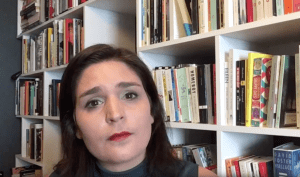
Below is an excerpt from Ms Potter’s assembly with all Senior School girls. The full video is available on Teams.
On May 25th in the American city of Minneapolis, George Floyd, a 46-year-old black man, was killed during an arrest for allegedly using a counterfeit bank note. White police officer Derek Chauvin knelt on Floyd’s neck for 8 minutes and 46 seconds, while Floyd was handcuffed and lying face down in the street, begging for his life and repeatedly saying “I can’t breathe”.
Floyd’s death has triggered demonstrations and protests in cities around the world against police brutality, police racism, and lack of police accountability, including here in London and elsewhere in the UK.
One simply cannot condense everything that has happened since the death of George Floyd down to five minutes. But what is clear, is that many of us are beginning to wake up to a world which we realise is deeply unequal, where people of colour can recall the very moment in their youth when they were told that they were regarded by society as different. We need to examine our own colonial history and how it relates to our present. We as educators need to examine how that history is taught and understood for the good of our society.
I have very much appreciated the conversations I have had with many sixth formers and colleagues over the past week. I have been impressed by your cogent and articulate arguments and ideas about how we need to take action as a school. I also have shared my own anxieties about delivering this assembly and desire to make sure I “get it right”. I am not here to patronise you, to pretend that I understand your life experiences and to tell you how to think and respond to the events of the past two weeks and beyond. Each and every storyline, each and every event, personal and global, deserves to occupy its own space in our heads and in our hearts. And I will not diminish them by packaging them up for you now. These stories are complex and human, difficult and chaotic and brutal.
I am not going to pretend to have the answers. I know that I don’t. But what I have also realised is that you don’t have to have the solutions to a problem to know that there IS a problem. We all know there’s a problem. We’re ALL alive to the fact that there’s a problem in a way that possibly no one in our society has quite experienced it before.
So, please don’t think because you’re young, you know less than we do about this experience. But, on balance, please don’t think you may know more than anyone either. I would ask everyone to bring their personal experiences together for the collective conversation. Whatever our age, ethnicity, social background, we all have something to contribute.
So, I say to those of you of colour, tell the people of white privilege what your experiences of racism have been. And to the white people of privilege, I ask that you contribute by listening. And I mean really listening; without ego, without defence mechanisms, without feeling like it’s on you and you alone to solve this right now. Because you can’t and you won’t. Let people talk without fear of being judged and let people listen without fear that they are being attacked. Spend time with each other. Engage with each other. Hang out with each other.
As the actor John Boyega said in his brilliantly impassioned speech last week, “This does not stop when you leave here.” The conversation is only just starting. You all, regardless of your age, gender and ethnicity are part of something big. Engage with it. Really engage with it.
There is a different energy in the world right now. Every single one of us feels it. Let’s all do something positive with that energy. Every single pupil in our community here is the future of this country, and this country’s conversation with rest of the world.
